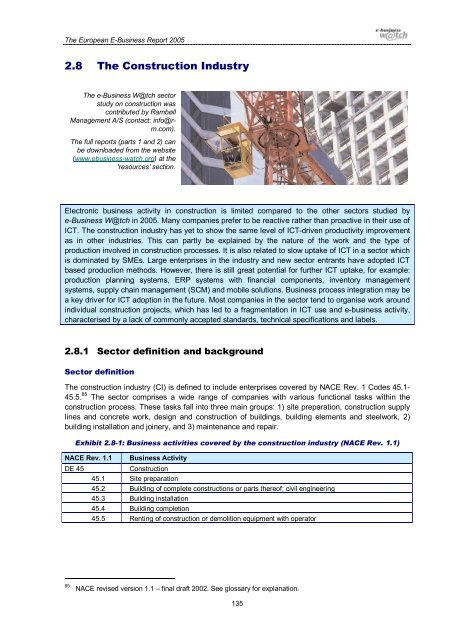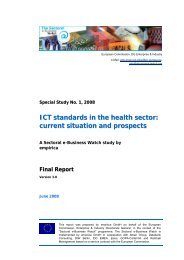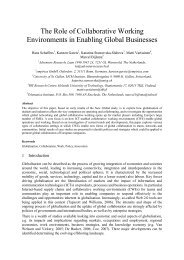The European e-Business Report The European e ... - empirica
The European e-Business Report The European e ... - empirica
The European e-Business Report The European e ... - empirica
You also want an ePaper? Increase the reach of your titles
YUMPU automatically turns print PDFs into web optimized ePapers that Google loves.
<strong>The</strong> <strong>European</strong> E-<strong>Business</strong> <strong>Report</strong> 2005<br />
2.8 <strong>The</strong> Construction Industry<br />
<strong>The</strong> e-<strong>Business</strong> W@tch sector<br />
study on construction was<br />
contributed by Rambøll<br />
Management A/S (contact: info@rm.com).<br />
<strong>The</strong> full reports (parts 1 and 2) can<br />
be downloaded from the website<br />
(www.ebusiness-watch.org) at the<br />
'resources' section.<br />
Electronic business activity in construction is limited compared to the other sectors studied by<br />
e-<strong>Business</strong> W@tch in 2005. Many companies prefer to be reactive rather than proactive in their use of<br />
ICT. <strong>The</strong> construction industry has yet to show the same level of ICT-driven productivity improvement<br />
as in other industries. This can partly be explained by the nature of the work and the type of<br />
production involved in construction processes. It is also related to slow uptake of ICT in a sector which<br />
is dominated by SMEs. Large enterprises in the industry and new sector entrants have adopted ICT<br />
based production methods. However, there is still great potential for further ICT uptake, for example:<br />
production planning systems, ERP systems with financial components, inventory management<br />
systems, supply chain management (SCM) and mobile solutions. <strong>Business</strong> process integration may be<br />
a key driver for ICT adoption in the future. Most companies in the sector tend to organise work around<br />
individual construction projects, which has led to a fragmentation in ICT use and e-business activity,<br />
characterised by a lack of commonly accepted standards, technical specifications and labels.<br />
2.8.1 Sector definition and background<br />
Sector definition<br />
<strong>The</strong> construction industry (CI) is defined to include enterprises covered by NACE Rev. 1 Codes 45.1-<br />
45.5. 85 <strong>The</strong> sector comprises a wide range of companies with various functional tasks within the<br />
construction process. <strong>The</strong>se tasks fall into three main groups: 1) site preparation, construction supply<br />
lines and concrete work, design and construction of buildings, building elements and steelwork, 2)<br />
building installation and joinery, and 3) maintenance and repair.<br />
Exhibit 2.8-1: <strong>Business</strong> activities covered by the construction industry (NACE Rev. 1.1)<br />
NACE Rev. 1.1<br />
DE 45<br />
<strong>Business</strong> Activity<br />
Construction<br />
45.1 Site preparation<br />
45.2 Building of complete constructions or parts thereof; civil engineering<br />
45.3 Building installation<br />
45.4 Building completion<br />
45.5 Renting of construction or demolition equipment with operator<br />
85<br />
NACE revised version 1.1 – final draft 2002. See glossary for explanation.<br />
135

















